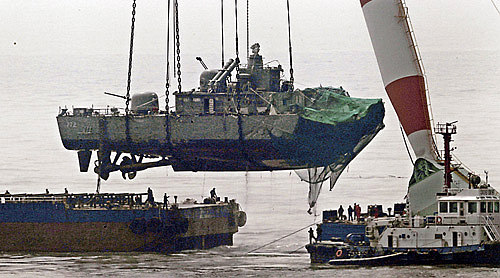|
 |
|
SALVAGING: A floating crane lifts the stern of the sunken warship Cheonan to place it on a barge on April 15 (XINHUA/AFP) |
 |
|
(COURTESY OF SHI YONGMING) |
Relations across the 38th Parallel recently sank to a record low since the Cold War ended. On March 26, the South Korean corvette Cheonan exploded while on patrol near the contested sea border with North Korea. After a multinational investigation, Seoul announced that the warship was torpedoed by a North Korean submarine. Regarding the incident as an offensive attack, it vowed to take "resolute measures" against North Korea. Pyongyang, however, rejected the charge, saying the incident was a plot orchestrated by Seoul.
The complex relationship between North Korea and South Korea is a legacy of the Cold War. Despite their strong aspirations for reunification, the two sides recognized the status quo as they joined the UN simultaneously when the Cold War ended. Their relationship has since become a relationship between two equal states from a legal point of view, but neither side is willing to accept separation in the long term. As a result, achieving reunification and getting along with each other before reunification have become critical questions for both sides. These two questions, coupled with the Korean Peninsula nuclear issue, have greatly affected Pyongyang-Seoul ties during past years.
Years of change
After the end of World War II, the Korean Peninsula, which had long been colonized by Japan, faced the crucial task of establishing an independent state. Against the backdrop of the Cold War, the United States and the Soviet Union intervened in the process, with each backing one of the two conflicting political forces on the peninsula, which led to the peninsula's separation. At that time, both sides intended to achieve reunification by force. In this sense, the Korean War in the 1950s was almost inevitable. The war ended with an armistice instead of a peace agreement, partly because the two sides did not recognize each other's legitimacy.
In the 1970s, the idea of peaceful reunification gained currency on the Korean Peninsula. Following secret contacts in 1971, the two sides issued the South-North Joint Communiqué on July 4, 1972, establishing three principles for reunification—independence, peaceful reunification and great national unity.
Although the principles paved the way for rapprochement between North Korea and South Korea, mistrust remained. South Korea, most notably, has always been swinging between reconciliation and a hard-line policy, and between equal reunification and reunification led by South Korea, rendering its relations with North Korea unstable.
South Korea's policy adjustments led to the two warmest periods for bilateral relations. The first came at the end of the Cold War when South Korea started to move toward democracy. Roh Tae Woo, the first democratically elected South Korean president, adopted the Nordpolitik, or "northern policy," while pledging to achieve reconciliation and reunification on the Korean Peninsula. This positive gesture ushered in a new era of bilateral relations, marked by the signing of the Agreement on Reconciliation, Non-aggression, Exchanges and Cooperation in December 1991.
The second was during the administrations of Kim Dae Jung and Roh Moo Hyun from 1998 to 2008. The two presidents' policies toward North Korea demonstrated continuity, with both focusing on reconciliation. While Kim Dae Jung advocated the Sunshine Policy, Roh pursued a "policy for peace and prosperity." Each held a summit with North Korean leader Kim Jong Il. Both summits produced historic agreements that reaffirmed the three principles of 1972.
During the administration of Kim Young Sam from 1993 to 1998 between the two warmest periods, however, Pyongyang-Seoul relations underwent fluctuations. On the one hand, the planned South-North summit failed to materialize because of the death of North Korean leader Kim Il Sung in 1994. On the other, Kim Young Sam proposed a three-stage formula for reunification. Despite its merits, the formula calls for "democratic reunification," causing suspicion from North Korea.
On taking office in 2008, South Korean President Lee Myung Bak put forward a new vision for inter-Korean relations: South Korea was willing to provide economic assistance to help North Korea to achieve a $3,000 per-capita income if Pyongyang gave up its nuclear weapons and offered greater transparency. He held reservations about the South-North Joint Declaration signed at the 2000 summit, while rejecting the Declaration on the Advancement of South-North Korean Relations, Peace and Prosperity adopted at the 2007 summit. He also vowed to review a series of agreements reached between North Korea and South Korea. As a result, intergovernmental exchanges between the two sides were suspended, giving rise to tensions on the Korean Peninsula. Lee later adjusted his policy by stressing "mutual benefits and co-prosperity," while pursuing "reunification on the basis of free democracy." Considered as revisiting Kim Young Sam's policy, it was met with strong opposition from North Korea.
|
